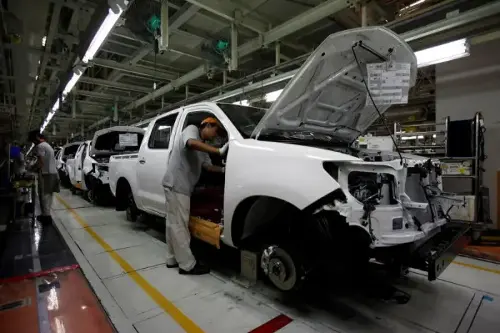
Car production in Thailand dropped 13.6% in February from a year earlier, as a lengthy decline in domestic sales and exports squeezed output for a 19th straight month, the Federation of Thai Industries (FTI) said on Tuesday.
The fall in production to 115,487 units, however, was smaller than the 24.6% slump seen in January.
“The less negative figures in February are not a sign of recovery yet because the numbers are very negative and rejection rates of auto loans are still high,” said Surapong Paisitpattanapong, spokesperson for the FTI’s automotive industry division.
“We have to wait and see in March for a clearer picture,” he said, adding that there were also more working days in February than in January.
Automakers are trying to deal with sluggish domestic car sales by cutting costs and launching new promotional campaigns which are expected to boost bookings at the Bangkok International Motor Show, which opened on Wednesday.
Domestic car sales dropped 6.7% in February from a year earlier to 49,313 units, after a drop of 12.3% in the previous month, weighed down by tightened auto loans, particularly for pickup trucks, due to high household debt, the federation said.
Household debt in Thailand stood at 16.34 trillion baht at the end of September 2024, equivalent to 89% of gross domestic product, among the highest ratios in Asia.
A government guarantee for pickup truck loans should help sales and the overall economy, Mr Surapong said. Domestic sales typically account for just under half of Thailand’s output, and about a third of vehicles sold locally are pickup trucks.
Exports fell 8.3% in February from a year earlier to 81,323 units after a drop of 28.1% the previous month, due mainly to increased competition from Chinese car brands and emission controls in some countries, Mr Surapong said. The federation will closely monitor the United States’ policy on auto tariffs, he said.
Last month, US President Donald Trump said levies on automobiles would come as soon as April 2.
The FTI has forecast car production to rise 2% this year after declining 20% in 2024 to record the lowest output in four years.
